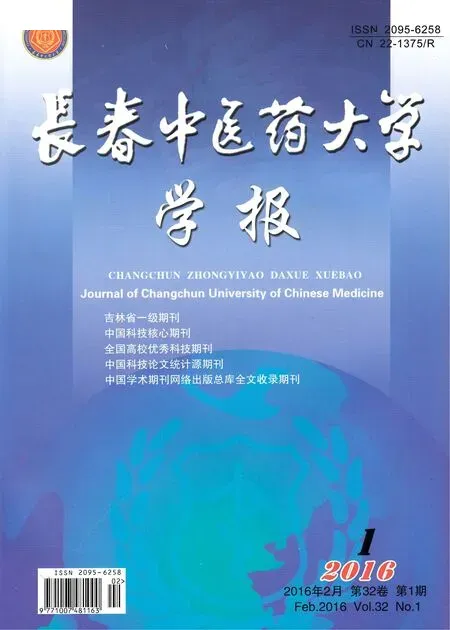心理护理对产后抑郁症的预防
孙素改,李春雷,左喜爱
(张家口市第二医院,河北 张家口 075000)
心理护理对产后抑郁症的预防
孙素改,李春雷,左喜爱
(张家口市第二医院,河北 张家口 075000)
摘要:目的观察心理护理对产后抑郁症发生的预防效果。方法选取定期产检并分娩的孕妇84例,随机分为治疗组和对照组,各42例,对照组给予孕妇常规产前知识讲座、定期心理培训;治疗组在对照组的常规处置基础上,对亲密家庭人员和孕妇行心理干预及预防产后抑郁症相关知识讲座,2组产妇均在产后15 d采用爱丁堡产后抑郁自评量表(EPDS)、生活质量评定量表(QOL)进行评分,并对比2组产后抑郁症发生率。结果治疗组EPDS评分明显低于对照组(P<0.05),QOL评分明显高于对照组(P<0.05),治疗组抑郁症发生率明显低于对照组(P<0.05)。结论亲密家庭人员和孕妇同时进行心理干预培训及预防产后抑郁症相关知识讲座能明显降低孕妇产后抑郁率,对预防产后抑郁症发生作用显著。
关键词:亲密家庭人员;心理干预;产后抑郁症
产后抑郁症是一组非精神的抑郁综合征,大多发病在产后2周内,产妇表现为失眠乏力、情绪激动、悲伤、抑郁等,不仅影响产妇的身心健康,还对婴儿的身心健康也有一定的影响[1-3],发病率为3.8%~16.7%,且有逐年上升的趋势[4-6]。本研究不仅对孕妇进行心理干预治疗,同时对产妇亲密家庭人员进行心理培训,并讲解预防产后抑郁症相关知识,取得良好效果。报道如下。
1资料与方法
1.1一般资料选取2013年1月—12月我院定期产检并分娩的符合纳入标准的孕妇84例,随机分为治疗组及对照组,各42例。治疗组年龄22~35岁;1胎24例,2胎18例;对照组年龄21~35岁;1胎29例,2胎13例。入选产妇产前均无心理障碍,头脑清晰,无心理及精神方面疾病,自愿参加调查,并能独立完成问卷。
1.2治疗方法2组产妇产前均定期实施常规产前知识讲座 、定期孕妇心理培训。治疗组在此基础上对家庭亲密人员共同进行心理培训及预防产后抑郁症相关知识讲座,包括:1)入院前孕妇分娩知识宣教,让孕妇及亲密家庭人员明白抑郁是产后最常见的心理问题,容易引起产妇抑郁的问题如母亲角色转换,婴儿哺乳问题等,由专业人员对孕妇及亲密家庭人员进行心理护理培训。2)让亲密家庭人员积极和孕、产妇交流沟通, 激发孕、产妇对周围事物、生活的兴趣,减轻产妇产后出现情绪不稳,担心、焦虑等,从而避免发展成抑郁症,并讲解产后抑郁症相关知识。3)亲密家庭人员为产妇提供亲密、舒适的家庭休养环境,满足产妇的生活需要,更多关心和体贴产妇,随时进行心理、生活的帮助,如鼓励产妇坚持母乳喂养婴儿的信心,帮助产妇康复锻炼,使产妇放松身心,产生愉悦的情绪 。有研究表明,亲密家庭人员的情感支持对产妇心理可起到正向性作用,能最大程度满足产妇心理需求[7]。
1.3调查方法2组产妇均于产后15 d进行问卷调查,问卷发放及评分固定由3名经验丰富的主管护师进行处理,采用爱丁堡产后抑郁自评量表(EPDS)进行抑郁程度评分,EPDS 共 10项,10项相加满分为30 分。阴性:总分≤12分;阳性:总分>13分,评分阳性产妇即可确认为产后抑郁症。采用生活质量评定量表(QOL)进行生存质量评分,QOL共6个领域,24个方面以及1个一般健康状况和生存质量的评分,得分越高生存质量越好。评价问卷由3名经验丰富的主管护师当场发放,由产妇亲自填写完成后回收,并由主管护师确认问卷真实有效。2组共发放问卷84份,全部有效回收。

2结果
2.12组分娩前后EPDS、QOL评分比较见表1。


组 别KEPDS产前产后15dQOL产前产后15d治疗组9.4±2.35.8±3.4#18.96±7.8663.24±3.25#对照组9.3±5.17.9±2.7 19.02±1.6753.46±4.62
注:与对照组比较,#P<0.05
2.22组抑郁症发生率比较治疗组抑郁自评量表阳性者3例(7.1%),对照组阳性者7例(16.7%),2者比较,差异有统计学意义(P<0.05)。
3小结
产后抑郁症的发病是多方面因素相互作用的结果,主要有生物学因素、心理因素和社会因素等3个方面[8-10]。孕妇的心理情绪与亲密家庭人员各方面的支持密不可分,本研究通过专业的心理知识培训及预防产后抑郁症相关知识讲座,亲密家庭人员更了解孕产妇生理、心理的变化以及抑郁症发生的危险因素。发挥亲密家庭人员的主观能动性,应用学习的专业心理知识去护理孕、产妇,从多方面了解孕、产妇的心理情绪,对其担心、焦虑的问题随时给予解答,帮助孕、产妇克服各种不良情绪的产生,避免各种心理障碍诱发产后抑郁症的发生[11-13]。
参考文献:
[1]BENER A,BURGUT F T,GHULOUM S,et al.A study of postpartum depression in a fast developing country:prevalence and related factors[J].International Journal of Psychiatry in Medicine,2012,43(4):325-337.
[2]VIGOD S L.Prevalence and risk factors for postpartum deression among women with preterm and low-birth-weight infants:a systematic review[J].BJOG :an International Journal of Obstetrics and Gynaecology,2010,117(5):540-550.
[3]MOSHKI M,BALOOCHI BEYDOKHTI T,CHERAVI K.The effect of educational intervention on prevention of postpartum depression:an application of health locus of control[J].Journal of Clinical Nursing,2014,23(15/16):2256-2263.
[4]BOBO W V,YAWN B P.Concise review for physicians and other clinicians:postpartum depression[J].Mayo Clinic Proceedings,2014,89(6):835-844.
[5]VLIEGEN N,CASALIN S,LUYTEN P.The course of postpartum depression[J].Harvard Review of Psychiatry,2014,22(1):1-22.
[6]SLATTENGREN A H,PRASAD S,KAISERUDDIN M A.PURLs:should you screen for postpartum depression?[J].The Journal of Family Practice,2013,62(11):E1-E3.
[7]姜越娟,姜群群.产后抑郁症的心理学研究进展[J].中国药物经济学,2013(5):542-543.
[8]DUDEK D,JAESCHKE R,SIWEK M,et al.Postpartum depression:identifying associations with bipolarity and personality traits.Preliminary results from a cross-sectional study in Poland[J].Psychiatry Research,2014,215(1):69-74.
[9]GAILLARD A,LE STRAT Y,MANDELBROT L,et al.Predictors of postpartum depression:prospective study of 264 women followed during pregnancy and postpartum[J].Psychiatry Research,2014,215(2):341-346.
[10]SOCKOL L E,EPPERSON C N,BARBER J P.Preventing postpartum depression:a meta-analytic review[J].Clinical Psychology Review,2013,33(8):1205-1217.
[11]STUART S,KOLEVA H.Psychological treatments for perinatal depression[J].Best Practice & Research Clinical Obstetrics & Gynaecology,2014,28(1):61-70.
[12]VENKATESH K K,ZLOTNICK C,TRICHE E W,et al.Accuracy of brief screening tools for identifying postpartum depression among adolescent mothers[J].Pediatrics,2014,133(1):45-53.
[13]朱跃兰,唐启盛,杨歆科,等.产后抑郁症生物学相关病因及发病机制研究进展[J].北京中医药,2013(3):168-176.
Psychological nursing in preventing postpartum depression
SUN Sugai,LI Chunlei,ZUO Xiai
(The Second Hospital of Zhangjiakou City in Hebei Province,Zhangjiakou 075000,Hebei Province,China)
Abstract:ObjectiveTo observe the effect of professional psychological intervention to the pregnant women and their intimate family members in preventing the occurrence of postpartum depression.MethodsA total of 84 pregnant women who came for regular antenatal examination and delivery were included in the study and randomized into the observation group and the control group with 42 cases in each group.The pregnant women in the control group were given routine prenatal knowledge lecture and regular psychological training.On this basis,the pregnant women in the observation group were given psychological intervention to the pregnant women and their intimate family members and related knowledge lecture about how to prevent the postpartum depression.EPDS and QOL were used for scoring for the pregnant women in the two groups 15 d after delivery.The occurrence rate of postpartum depression in the two groups was compared.ResultsEPDS score in the observation group was significantly lower than that in the control group (P<0.05),while QOL score was significantly higher than that in the control group (P<0.05).he occurrence rate of depression in the observation group was significantly lower than that in the control group (P<0.05).ConclusionPsychological intervention to the pregnant women and their intimate family members and related knowledge lecture about how to prevent the postpartum depression can significantly reduce the postpartum depression rate with a significant effect to prevent the postpartum depression.
Keywords:intimate family members;psychological intervention;postpartum depression
(收稿日期:2015-10-20)
文章编号:2095-6258(2016)01-0156-03
中图分类号:R248.3
文献标志码:A
作者简介:孙素改(1971-),女,大学本科,主管护师,主要从事妇产科临床研究。
基金项目:河北省科技研究与发展指导项目(1021957D)。
DOI:10.13463/j.cnki.cczyy.2016.01.054

